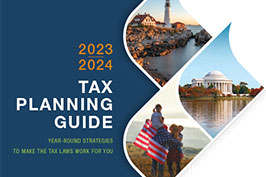Top 3 common tax mistakes
If you make mistakes on either your federal or state tax returns, it can cost you money. Not only could you end up missing out on a larger refund, but you may end up having to owe the IRS more taxes in addition to having to pay interest as well as any assessed penalties. And, mistakes on your tax returns can trigger an IRS audit. No one wants to get that letter in the mail!
Every year, the IRS lists several common tax mistakes that filers make on its website, from failing to calculate a deduction to forgetting to sign and date a return. The best defense against this is to be aware of what to watch for and what to avoid when you’re filling out your tax returns.
Make sure that your basic information, including your name, Social Security number, and filing status are filled out correctly on your returns. Report all financial information exactly as it has been reported to the IRS on your W-2, 1099s, or K-1. Check to make sure that you’ve entered items on the correct lines, and, if you’re owed a refund, tell the federal and/or state government how you would like to receive it — by a check sent in the mail or electronically deposited into one of your bank accounts.
Testimonial
Our list
Some tax mistakes with costly consequences include:
- Claiming the wrong filing status
- Missing deadlines
- Overlooking valuable tax deductions
Filing an inaccurate return or missing filing deadlines could mean that you’ll have to pay additional taxes and interest or face a penalty. Choosing the wrong filing status and/or overlooking valuable tax deductions can result in a smaller refund.
In order to avoid many of these common mistakes, the IRS recommends filing your taxes electronically because tax software does the math for you, flags common errors, and lets you know if you’ve missed any necessary information.
CTA – Your tax planning guide

Other potential tax mistakes
Major changes were made to the tax code in 2017 that affected what expenses could be written off on your return. One mistake that many people are making is still relying on outdated write-offs which can be costly if you’re spending more money in ways that are no longer beneficial. Misunderstanding how tax extensions work can result in additional penalties and interest. An extension simply grants you additional time to submit your return; you still need to send a payment for what you may owe.
If you don’t claim the correct number of exemptions on your W-4, you’re going to end up getting too much money back each year. That’s money that you could’ve used to pay off credit card debt, a car loan, or put toward an investment. Ideally, you want to have just enough money withheld from your paycheck so that you break even at the end of year.
Using a qualified tax professional, such as CPA, can significantly reduce the chances of these types of errors on your return, especially if your tax situation is complicated. GYL CPAs and Advisors, personal tax professionals located in Ontario, provide a full range of accounting, audit, and tax services for individuals as well as businesses and not-for-profits.
CTA – Who we serve

